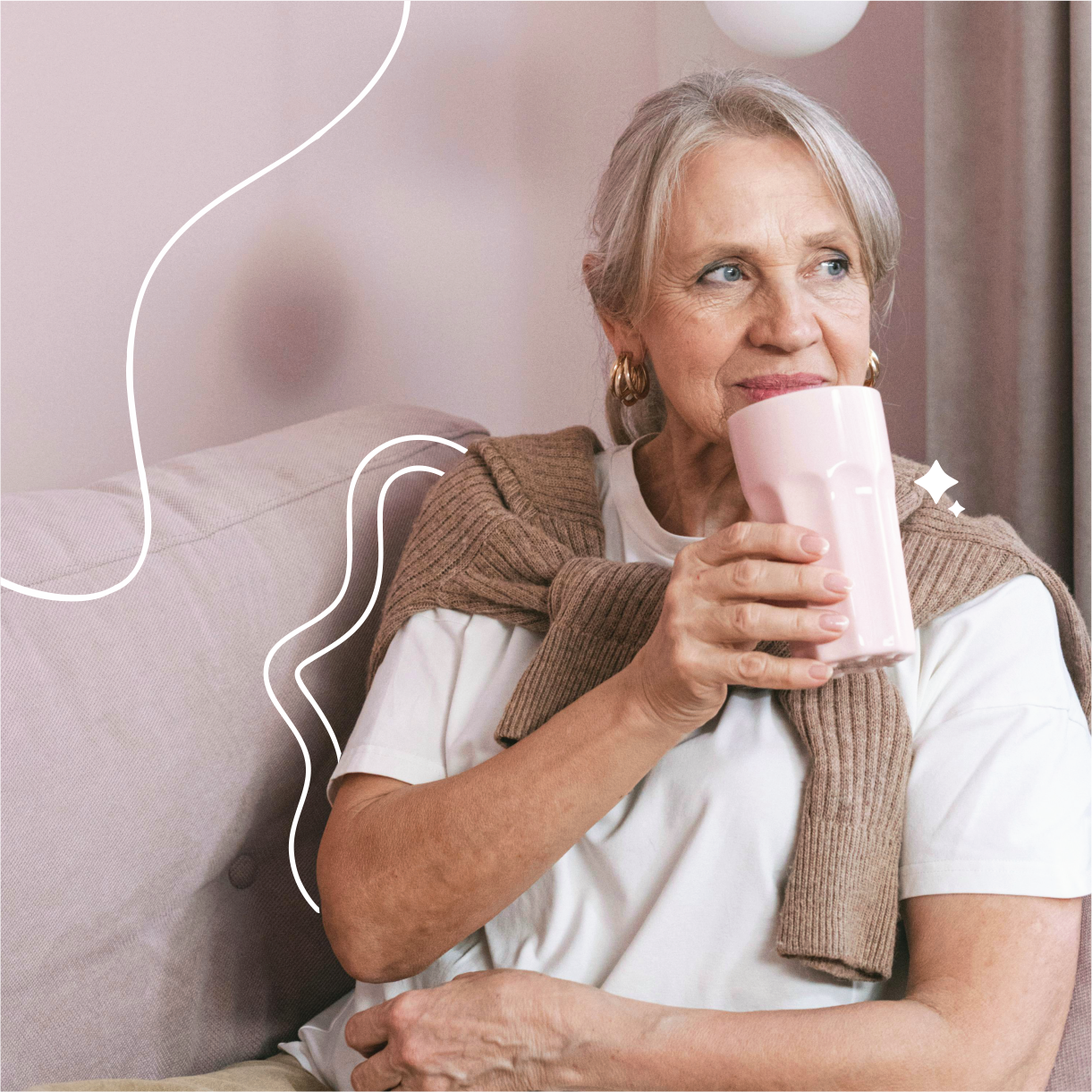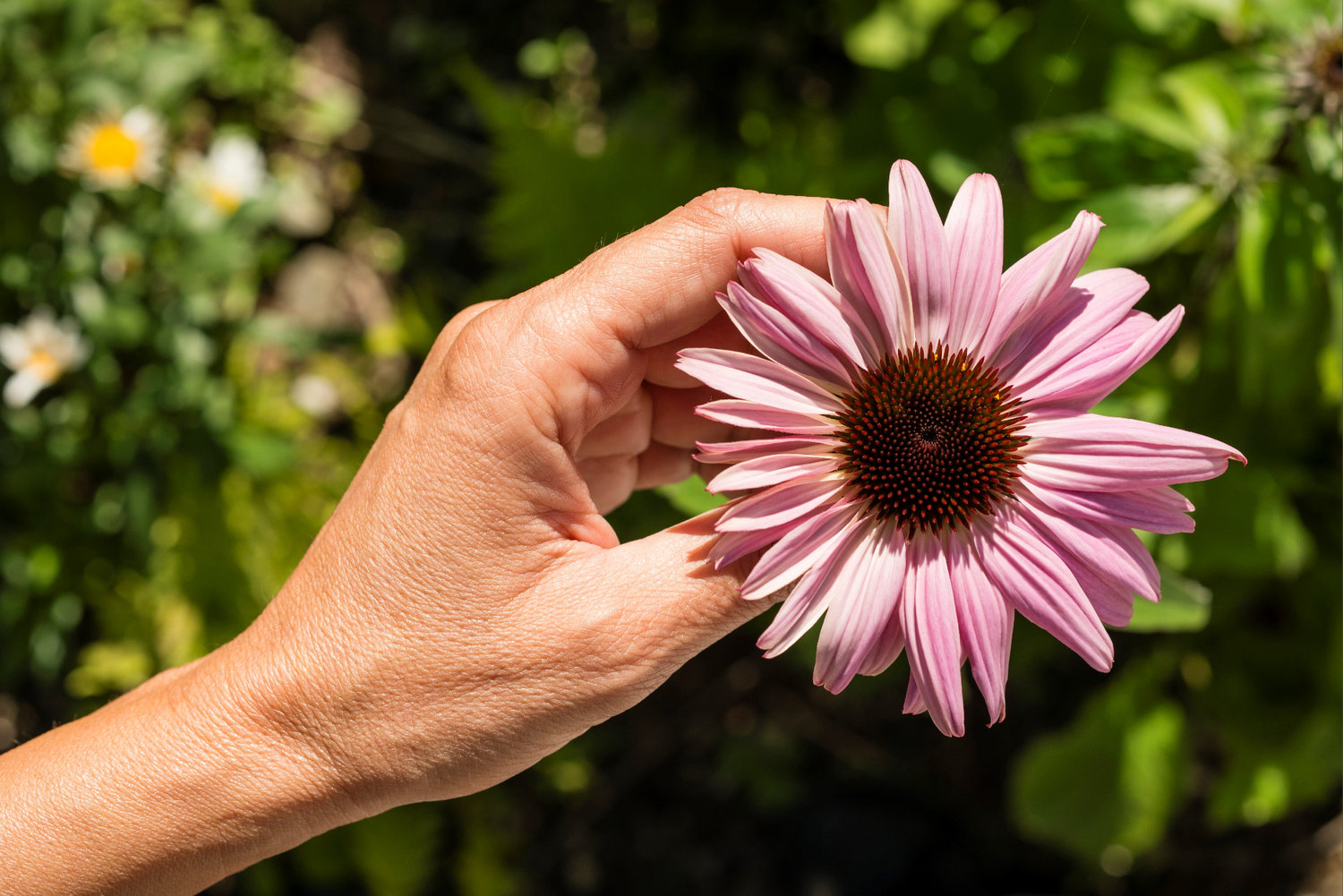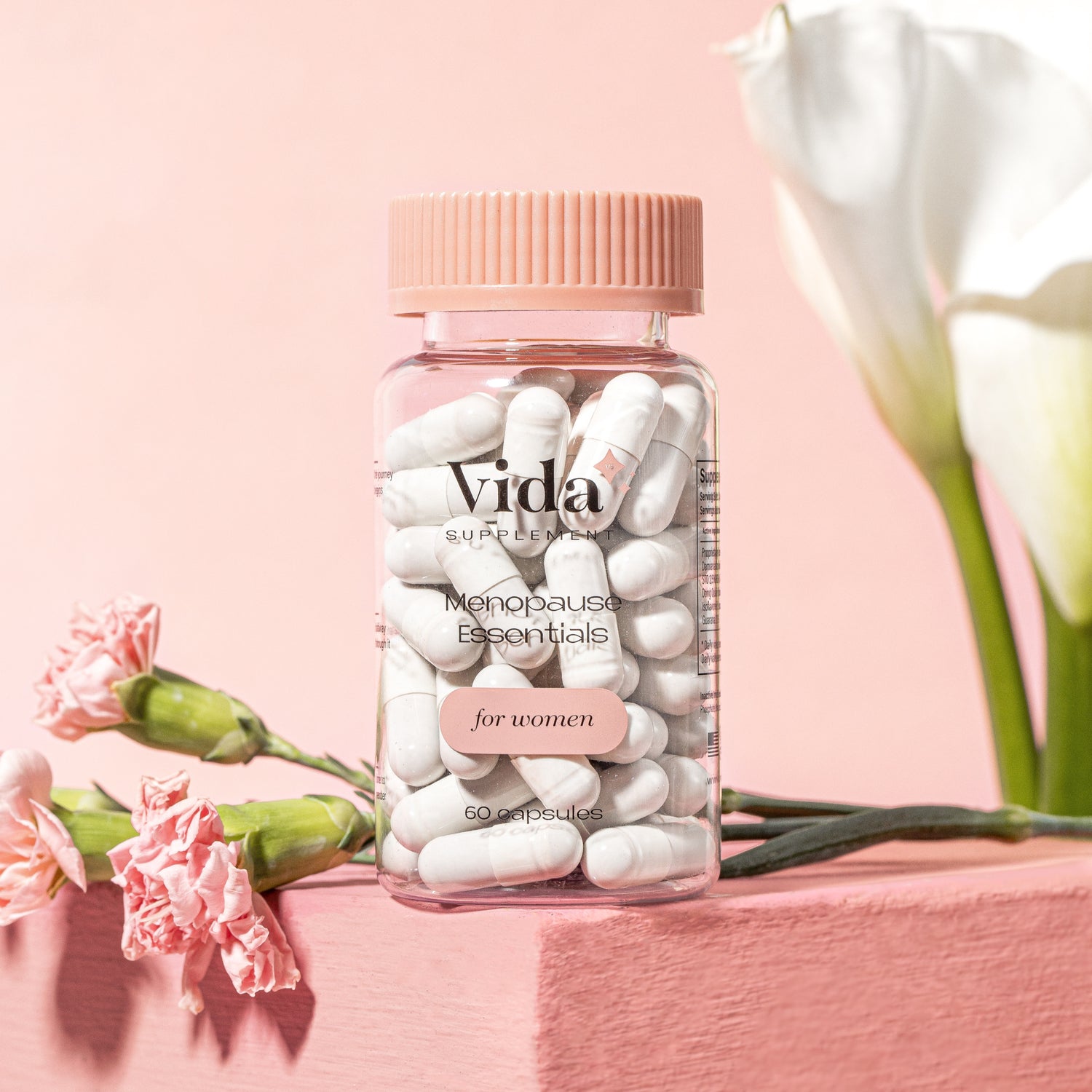Menopause is much more than just a biological change; it is a complex and deeply personal stage in a woman's life. Although it is a universal phenomenon, each experience is unique and comes with its own set of challenges. Did you know that up to 80% of women in developed countries experience vasomotor symptoms that can affect their quality of life for four to seven years? Despite this, menopause remains a taboo subject, with a 77% of the general population lacking knowledge on how to manage it. Additionally, fatigue and lack of concentration, less recognized symptoms, are manifestations of the hormonal imbalance that characterizes this stage and affect your ability to fully enjoy life.
In Vida Supplement, you are our inspiration. We understand that each stage of life brings its own challenges and special moments. We want you to know that we are here to support you, to listen to you, and to walk with you on this journey.
What is menopause?
Menopause marks the permanent cessation of your menstrual periods and the inability to conceive. You have reached this moment only after a full year without menstruation, which means you have not experienced any type of bleeding, not even spotting, for 12 consecutive months. After menopause, your ovaries produce very low levels of the hormones estrogen and progesterone, which can increase the risk of certain health problems.

The transition to menopause or perimenopause
The transition to menopause or perimenopause marks a period of change in your life. Menopause occurs approximately 12 months after your last period, but before that, you may experience changes in your menstrual cycles, hot flashes, or other symptoms. This is known as the transition to menopause or perimenopause. This process usually begins between the ages of 45 and 55 and can last from 7 to 14 years, depending on various factors such as lifestyle, age of onset, and ethnic background.
What are the signs and symptoms of menopause?
The signs and symptoms of menopause can vary in intensity and affect each woman uniquely. As estrogen levels decline, various symptoms may arise that affect different parts of the body. Some women experience mild symptoms that can be managed with lifestyle changes, such as avoiding caffeine or using a portable fan. However, for others, the symptoms may be more severe and require treatment.
"Below are some of the most common changes you may experience in middle age, although it is important to remember that some of them may be part of the aging process rather than being directly related to menopause."
Expandable content
Changes in the menstrual period
Changes in the menstrual period can be one of the first signs you notice during the transition to menopause. Your periods may no longer be as regular as they used to be, becoming shorter or longer, with variations in the amount of bleeding. These changes are normal at this stage of life, but it is important to pay attention to certain indicators that may signal the need to consult your doctor:
- Your periods occur very frequently.
- You experience heavy bleeding.
- You observe unusual blood stains.
- Your periods last more than a week.
- Your periods resume after a year or more of not having bleeding.
Your doctor can provide you with guidance and evaluation to ensure your health during this transition process.
Hot flashes
They are a common symptom experienced by many women during and after menopause, and they can persist for several years. These sudden episodes of heat are closely related to changes in estrogen levels. During a hot flash, you will experience a sudden feeling of heat that affects the upper body or the entire body, often accompanied by facial and neck flushing, as well as red spots on the chest, back, and arms. Intense sweating and chills may follow the hot flash, which can sometimes be intense enough to wake you up during the night (known as night sweats). The duration of a hot flash typically ranges from 30 seconds to 10 minutes, occurring several times an hour, several times a day, or only once or twice a week.
Bladder control
This can be a challenge for some women during menopause, and the loss of control is known as incontinence. You may experience a sudden urge to urinate or leaks of urine during activities such as exercise, sneezing, or laughing. It is crucial to seek the guidance of a doctor as the first step in addressing incontinence. Additionally, bladder infections can also influence these symptoms and require appropriate medical attention.
Dream
It can become a challenge for you around middle age. You may find it difficult to fall asleep at night or wake up prematurely. Night sweats can also disrupt your sleep, waking you up in the middle of the night. If you find yourself awake during the night, you may experience difficulties falling back asleep. These changes in your sleep pattern are common during menopause and can affect your quality of life.
Vaginal dryness
The deficiency of estrogen that occurs at this stage leads to thinning of the vaginal lining, resulting in vaginal dryness, itching, and pain during sexual intercourse (dyspareunia). This problem begins to manifest in perimenopause but becomes more evident in postmenopause, when estrogen levels decrease significantly.
Reduction of libido
You may notice a decrease in your libido during menopause, caused by the hormonal changes characteristic of this stage. Vaginal dryness can also contribute, as it can make sexual intercourse painful. Additionally, the decrease in blood flow to the vaginal and vulvar region due to estrogen deficiency can reduce your ability to experience pleasure during sex. It is important to address these changes with your doctor to explore treatment options and improve your sexual satisfaction and overall well-being.
Mood changes
You may feel more moody or irritable. Scientists do not yet fully understand why this happens, but factors such as stress, changes in the family (such as children growing up or aging parents), a history of depression, or feelings of fatigue can contribute to these mood changes.
The body looks different.
You may notice that your waist expands, that you lose muscle and gain fat, and that your skin becomes thinner. Additionally, you may experience memory problems and feel stiffness and pain in your joints and muscles. Scientists are investigating these changes and how they relate to hormones and the aging process.
Bad memory
During perimenopause, estrogen plays an important role in the normal functioning of the female brain. It is common to experience short-term memory lapses at this stage, which manifest as trivial forgetfulness such as where you left your keys, your friends' birthdays, or meeting dates. While these forgetfulness episodes are usually not serious, they can cause discomfort, especially in very meticulous individuals.
Joint pain
The decrease in estrogen levels can affect the health of joints, tendons, ligaments, and muscles. Approximately 60% of women in premenopause experience joint pain, with obese or overweight women being the most affected. Unlike many other menopause symptoms that may decrease after menopause, joint pain tends to persist.
Dry skin
The reduction of estrogen levels is related to a decrease in collagen production, which is the substance that keeps your skin firm and looking good.
Therefore, when collagen production changes, the skin becomes thinner, drier, more flaky, and less youthful. Skin dryness can cause itching, which in some cases can be very unpleasant.
Loss of hair
The health of women's hair is also related to levels of estrogen and collagen. In premenopause, a woman begins to notice a change in the quality of her hair, becoming increasingly dry, brittle, and falling out more easily. This situation tends to worsen in postmenopause.
"In addition, for some women, symptoms may include pain and discomfort, headaches, and heart palpitations. Consult a doctor. Because menopause symptoms can be caused by changes in hormone levels, the frequency with which women will experience symptoms and the severity of these is unpredictable."

What is postmenopause?
It is the period of life that follows menopause. In summary, menopause marks the moment when a person permanently stops having menstrual cycles, as their hormone levels are too low for menstruation to occur. When more than a year has passed without having a menstrual period, it is considered that the person has gone through menopause and is officially in postmenopause.
Phases of the reproductive cycle
Frequently Asked Questions Section
Should I continue using contraceptive methods during the transition to menopause?
During the transition to menopause, it is important that you continue to use contraceptive methods. Even if you no longer have your periods regularly, there is still a possibility of becoming pregnant during perimenopause, as you may still ovulate or release an egg some months. However, it is impossible to predict with certainty when ovulation will occur. Therefore, if you do not wish to become pregnant, it is crucial that you continue to use contraceptive methods until one year after your last period. I recommend talking to your doctor to discuss your contraceptive options and get more information about the different methods available.
It is important to keep in mind that after menopause, you will no longer be able to get pregnant, but there is still a risk of contracting sexually transmitted infections (STIs or STDs). After menopause, you are more likely to contract an STI from having unprotected sex. Vaginal dryness or irritation is more common after menopause and can cause small cuts or tears during sexual intercourse, exposing you to STIs.
How do I know if I am in menopause?
Menopause is diagnosed after twelve months have passed without a menstrual period. The most common symptoms are hot flashes, night sweats, insomnia, mood swings, weight gain, or vaginal dryness.
At what age is menopause normal and when is it too early?
Menopause can occur between the ages of 40 and 50, but the average age is 51. When menopause occurs before the age of 40, it is referred to as early or premature menopause.
What symptoms can I expect during the transition to menopause?
During the transition to menopause, you may experience signs and symptoms such as irregular menstrual periods, vaginal dryness, hot flashes, chills, night sweats, sleep problems, mood changes, weight gain, and slow metabolism.
Can I still get pregnant during menopause?
No, once a woman has gone through menopause, it is highly unlikely that she can become pregnant without assistance. However, during the preceding process, in perimenopause, there are still possibilities of pregnancy.
What non-hormonal natural treatments exist to improve menopause symptoms?
There are several natural remedies that can help alleviate the symptoms of menopause. Some of the most effective are red clover, dong quai, black cohosh, sage, chamomile tea, soy isoflavones, among others.
Practical tips for coping with menopause

Activate your well-being
"Exercise regularly, not just to control your weight, but also to improve your mood and the quality of your sleep. Yoga or Pilates are excellent for strengthening your pelvic floor and improving your flexibility."
Nourish your body with intelligence
A balanced diet is essential. Include fruits, vegetables, whole grains, lean proteins, and healthy fats in your meals. Limit processed foods, sugars, and salt. Make sure to consume enough calcium and vitamin D to keep your bones strong.
Prioritize your rest
Lack of sleep can intensify other symptoms of menopause. Establish a regular sleep routine, sleep in a cool and dark environment. Avoid screens before bedtime and use relaxation techniques if you have trouble falling asleep.
Take care of your emotional health
Menopause can be an emotional challenge. Share your experiences and feelings with friends, family, or a professional. Consider joining a support group to exchange advice and experiences with other women in the same situation.
Explore the power of natural supplementation
Menopause is an ideal time for you to connect with nature and explore the supplements that can relieve symptoms and improve your quality of life.
Menopause Essentials: A Journey of Wellness and Balance
"We deeply care about your well-being and want to ensure that you feel understood, valued, and cared for. That's why we are dedicated to creating a product that aligns with your unique needs before and during menopause."
In the search for relief and balance during menopause, Menopausia Essential presents itself as a comprehensive solution, formulated with a scientific and professional approach. This supplement combines natural ingredients such as Damiana. aphrodisiac, Black Cohosh, DHEA, he Ginkgo biloba, Dong quai, Tribulus terrestris, Maca, and others that have evidence of support in the management of menopausal symptoms.

Menopause Essentials
Our supplement is designed to address the challenges of menopause with a formula that acknowledges and respects the complexity of the female body. Each capsule is packed with the essence of nature and backed by science, offering comprehensive support that enhances your quality of life. Menopause should not be an obstacle to your vitality and well-being.



